Curious About Canine Nutrition: Can Dogs Drink Milk Safely?

Dogs and milk—it’s a classic image—a loyal pup lapping up a bowl of creamy white liquid. But despite appearances, is this scenario really as risk-free as it looks, or may it actually cause stomachaches and other digestive problems?
We’re going to take a deep dive into an age-old question in this article: Can dogs drink milk?
Let’s discuss all that in detail.
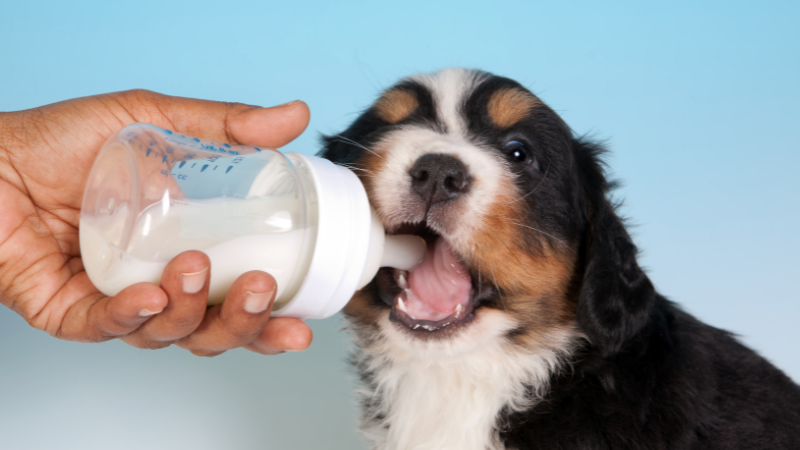
Can Dogs Drink Milk?
Dogs can drink milk, but it’s essential to be cautious. Lactose intolerance affects a lot of dogs since they don’t have the enzyme that allows them to digest milk properly.
In such circumstances, consuming milk might cause digestive difficulties such as nausea and vomiting as well as diarrhea. If your dog loves it and has a good tolerance for it, then giving it in tiny doses on occasion should be safe.
However, you should always keep an eye out for any unpleasant responses. Lactose-free milk or milk replacements designed specifically for dogs are safer solutions.
Is Milk Good or Bad for Dogs?
The effects of milk on dogs can range from helpful to harmful, depending on a number of different conditions.
Although some canines have no problems digesting milk, lactose intolerance can cause gastrointestinal distress in others. Lactose, the sugar found in milk, can only be digested properly with the help of the enzyme lactase.
Milk is usually manageable for dogs who have adequate lactase levels, but those who do not have enough lactase may have issues.
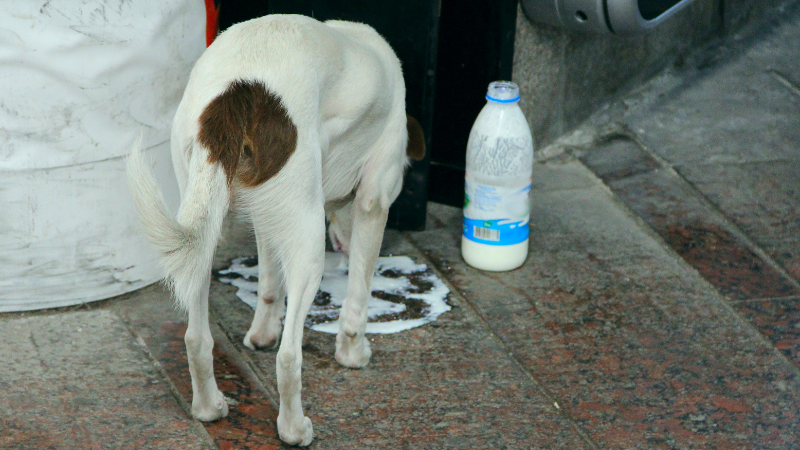
It is, therefore, dependent on the dog’s particular tolerance level as to whether or not milk is healthy for them.
If your dog is able to digest milk without experiencing any negative side effects, giving it to them in small amounts on occasion as a treat should be safe.
However, if your dog has lactose intolerance, it is better to steer clear of milk and instead choose options that do not contain lactose in order to prevent stomach troubles.
Always get the advice of your trusted veterinarian before making any changes to the food of your canine companion.
How Much Milk Is Sufficient for Dogs?
If you have confirmed that your dog is able to ingest milk without experiencing any negative side effects, you must limit the amount that they drink. Milk is something that should be used in moderation, both by people and by dogs.
As a general guideline, a small dog (under 20 pounds) can safely consume about a teaspoon of milk as an occasional treat.
Although bigger dogs are able to withstand a little bit more, it’s still important not to indulge them too much.
Lactose Intolerance in Dogs
As mentioned above, lactose requires an enzyme called lactase for proper digestion.
Some dogs have an abundance of lactase, allowing them to digest milk with ease. On the other hand, certain individuals may be missing this enzyme, which results in lactose intolerance. These dogs are termed lactose intolerant dogs.
Signs of Lactose Intolerance in Lactose Intolerant Dogs
Identifying lactose intolerance in your dog is crucial to ensure their well-being. Some common signs of lactose intolerance in dogs include:
- Bloating
- Stomach upset
- Diarrhea
- Vomiting
- Gas
If you notice any of these symptoms after your dog consumes milk, it’s a clear sign that they may be lactose intolerant.
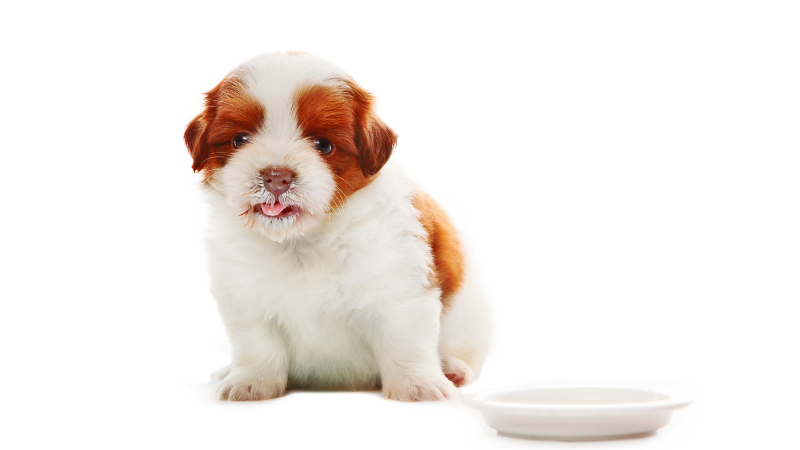
Prevention
While some dogs are naturally lactose intolerant, others may develop it over time. To prevent lactose intolerance or alleviate its symptoms, consider these steps:
- Gradual Introduction: If you want to give your dog milk, start with small amounts and observe their reaction.
- Lactose-Free Alternatives: Opt for lactose-free milk options if you’re concerned about your dog’s lactose intolerant behavior.
- Lactase Supplements: Consult your vet about lactase supplements that can help your dog digest milk more easily.
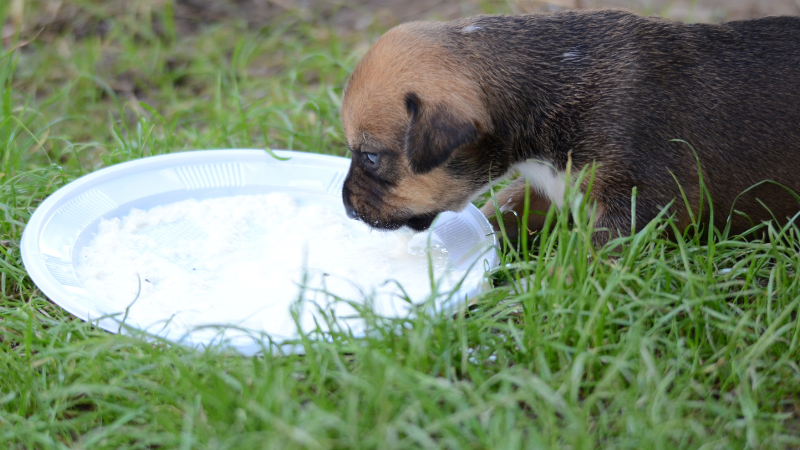
What If My Dog Drinks Too Much?
If your dog drinks milk in huge quantity, it may cause him or her to have intestinal pain. Consuming an excessive amount of milk can cause gastrointestinal problems such as nausea and vomiting, as well as diarrhea.
Always give your dog milk in moderation, and be sure to keep to the serving amounts that are advised depending on the size of your dog and how well they handle dairy allergy/products.
If you suspect that your dog has consumed an unhealthy amount of milk and is displaying symptoms of digestive distress, you should make an appointment with your veterinarian as soon as possible for advice to check on the health of your dog.
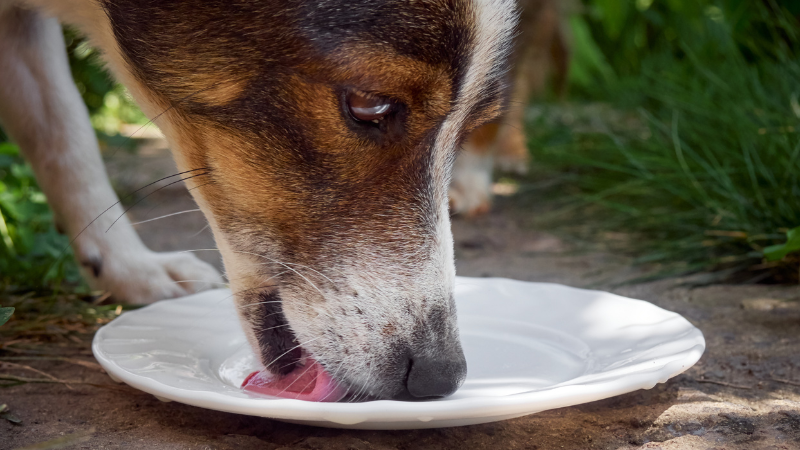
What About Other Dairy Products?
Extreme caution must be exercised even if some dogs are able to consume trace amounts of certain dairy products. When compared to milk, the lactose concentration of many dairy products, such as cheese and yogurt, is lower, which means some dogs may be able to tolerate them better.
However, because every dog’s tolerance is different, it is essential to keep a close eye on your dog after giving him any of these medications to ensure that he is not experiencing any indications of digestive distress.
Always introduce new dairy items gradually, starting with small portions, and watch for adverse reactions such as diarrhea or vomiting. If your dog exhibits signs of food allergies to a particular type of dairy product, it is better to steer clear of that product entirely.
Consulting with your veterinarian can help determine which dairy options, if any, are suitable for your dog’s diet.
Did you know that newborn puppies can be infected with roundworms if they ingest the infected mother’s milk? Let’s find out here.
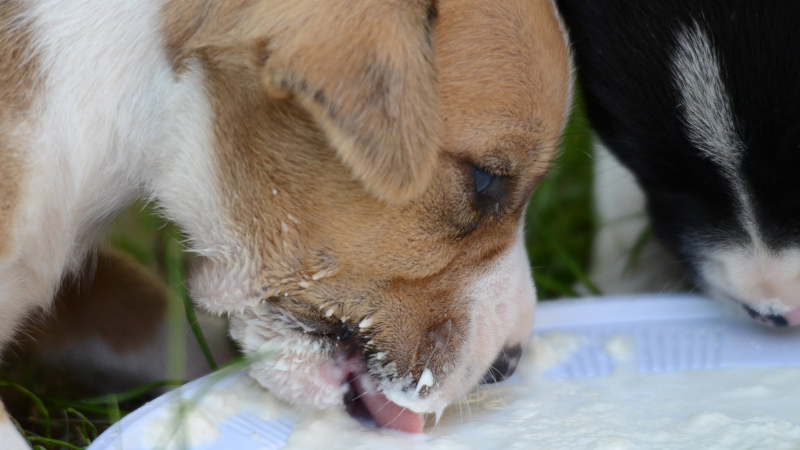
FAQs: Can Dogs Drink Milk?
Is Almond Milk or Soy Milk Safe for Dogs to Consume?
Although almond milk or soy milk does not pose a significant health risk to dogs in most cases, this does not make it a good option for feeding it to them. Choose lactose-free cow’s milk or a milk replacement designed specifically for dogs if you want to give your dog a reward that resembles milk.
Can a Dog Drink Cow’s Milk?
Although cow’s milk is the most common form of milk, the high lactose level of cow’s milk might make it difficult for many dogs to digest. If your dog does not exhibit any symptoms of lactose intolerance, it is possible that your pet can consume cow’s milk in very small amounts as a treat on occasion. However, use caution and pay attention to how they respond.
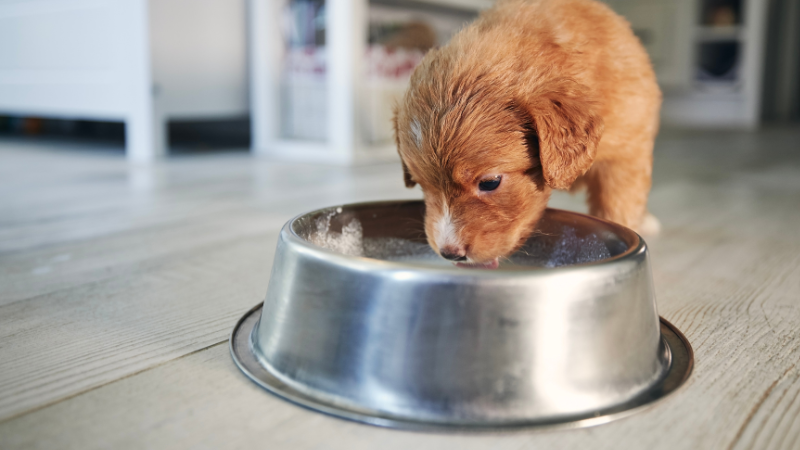
Can a Dog Drink Goat’s Milk?
When compared to cow’s milk, it is generally agreed that goat’s milk is easier for dogs to digest than cow’s milk. Goat’s milk could be easier for lactose-intolerant canines to digest than cow’s milk. As is the case with cow’s milk, you should begin with very small amounts and see how your dog reacts.
Have you ever thought of giving camel’s milk to your pups? Here, you can find out the effect of camel milk on a dog’s body.
Can Dogs Drink Oat Milk?
Oat milk is an alternative to cow’s milk that is made from oats and is acceptable for dogs to consume. Dog drinks milk of this kind on their own.
However, it is crucial to examine the contents to see whether there are any additives or sweets that your four-legged pet may find to be incompatible with their meal (dog’s diet). Always perform it in a slow and controlled manner while keeping an eye on your dog’s reaction.
Can a Dog Drink Colostrum?
Colostrum, sometimes known as first mother’s milk, is specially formulated for the growth and development of young animals and is especially important for pups. Despite the fact that it is not appropriate for adult dogs, it is of vital importance to the health and growth of young puppies.
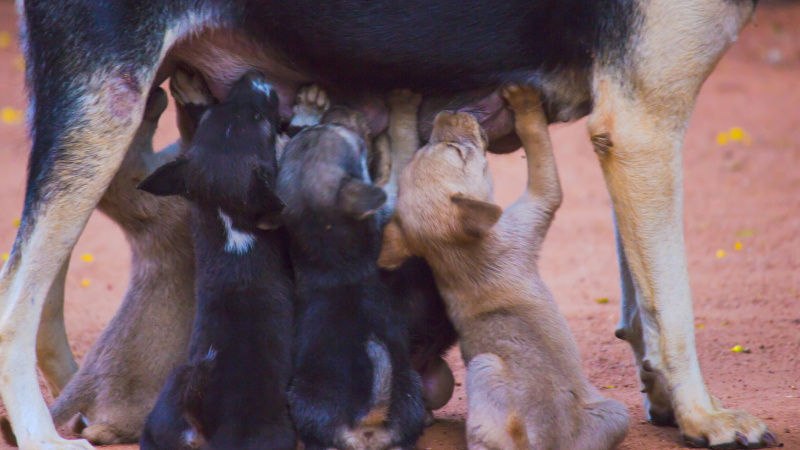
Conclusion: A Sip of Milk, A World of Caution
When it comes to the issue, “Can dogs drink milk?” the answer ultimately relies on how well your particular dog tolerates dairy products. When introducing a new meal or treat, it is critical to keep in mind the state of their digestive system and carefully observe their reaction to the change.
Keep in mind that moderation is essential, as some dogs are lactose intolerant. So, if you think your pet may be lactose intolerant, talk to your veterinarian about getting advice on appropriate alternatives.
To give your dog a treat that is both healthy and fun requires you to have a thorough awareness of its individual requirements and inclinations.
